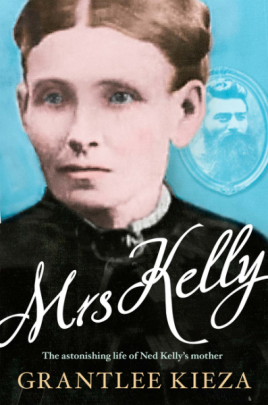The astonishing life of Ned Kelly’s mother

We are all familiar, to a greater or lesser degree, with the story of Ned Kelly, how the son of poor Irish immigrants became a scourge to society. Some, too, will have knowledge of Ned’s mother, Ellen, the woman who stood by her son for all of his short life. But few – and I number myself among them – will have true ken of the strength and character of the woman herself.
In the past week, I’ve been privileged to read a new book by Grantlee Kieza that tells Ellen’s story in carefully researched detail. It is called, simply, Mrs Kelly but carries the subtitle The Astonishing Life of Ned Kelly’s Mother.
In 1831, barely a handful of miles from the Giant’s Causeway in County Antrim, a fifth child is born to James and Mary Quinn; she is named Ellen. As a child, she is wild and hates restraint. A few years later, James, now the father of eight, applies for assisted passage to Melbourne. Accepted, the family departs in April 1841. Just months after their departure, John ‘Red’ Kelly, convicted of stealing two pigs, is transported for seven years.
The Quinns settle into life at Moonee Ponds on the outskirts of Melbourne, James industrious and running a few cows on a small parcel of rented land. Ellen grows into a striking girl with a strong will and, even so young, develops into a superb horsewoman. They move to Broadmeadows and then Wallan where the family operates a dairy farm and, although life is hard, are able to sit at night to a good meal. Life is far here than ever it was in Ireland.
In the meantime, Red Kelly is released and makes his way to Victoria where he meets James Quinn. It is 1850; Red is 30 and a real charmer. Ellen, now 18, meets him and, despite her father’s admonitions, a relationship develops. She …will be in love with this man for the rest of her life – in sickness and in health, for poorer and poorer which, sadly, is the operative term. By mid-year, the headstrong Ellen announces she is pregnant to Red.
In time, Red goes off to the Ballarat goldfields, returning with a little nest egg. He and Ellen pay £615 for a small farm at Beverige. Things go well for them, far better than they once dared to dream, but it is not to last. A number of poor decisions, combined with Red’s increasing dependence on drink, set them back. In December 1854 (the date never recorded), Ellen bears the couple’s third child. They name him for Red’s brother Edward.
Through all the years ahead, little ever seems to go right. By 1866, Red will drink anything with a kick. His heart and liver surrender; he suffers dropsy and is bedridden, dying two days after Christmas. Ellen, a 34 year-old widow with seven surviving children under thirteen, must now do it all on her own. Her main help comes from young Ned.
Necessarily the book repeats the story of Ned Kelly and his crimes against a frequently cruel society but there is one constant binding it all together, a feisty matriarch, Ellen. Through all the years, she outlives both husband and well-known son. She manages to overcome huge hurdles including a drunken husband, the loss of adult help and companionship, the raising of a large brood, a home burnt down by a careless relative, many moves (all regressive), a three-year jail term for assaulting a policeman; through it all she protects her son, lies for him, fights for him, hides him in the roof cavity of her home. She is ever protective.
In the end, Ellen is provided accommodation at Pentridge Gaol close to Ned’s cell, and must surely hear the springing of the gallows trapdoor. She is overcome with shock and grief, her eldest son dead, hanged. The date is 11 November 1880 and Ned not even 26 years of age.
____________
On 27 March 1923, Ellen looks out the window of Wangaratta Hospital …to the road she came down with her seven children half a century ago …poor as church mice. Ned led the way, her big, brave son. At 2:00 pm on a warm Autumn day, last surviving member of the original Quinns and Kellys, Ellen draws her last breath. The better life she had always wanted for her brood was never to be. There was rarely other than trouble and strife for her and her family. As the author says, In their torment her sons created misery for others.
Remarkably, through all the stress and trauma, she lives 92 years.
Grantlee Kieza’s Mrs Kelly has now become one of my favourites. I thank ABC Books, through Harper Collins, for the opportunity to read what I consider an exceptional essay.
Mrs Kelly available now from Dymocks. Click here to learn more.









 Proudly Australian owned and operated
Proudly Australian owned and operated